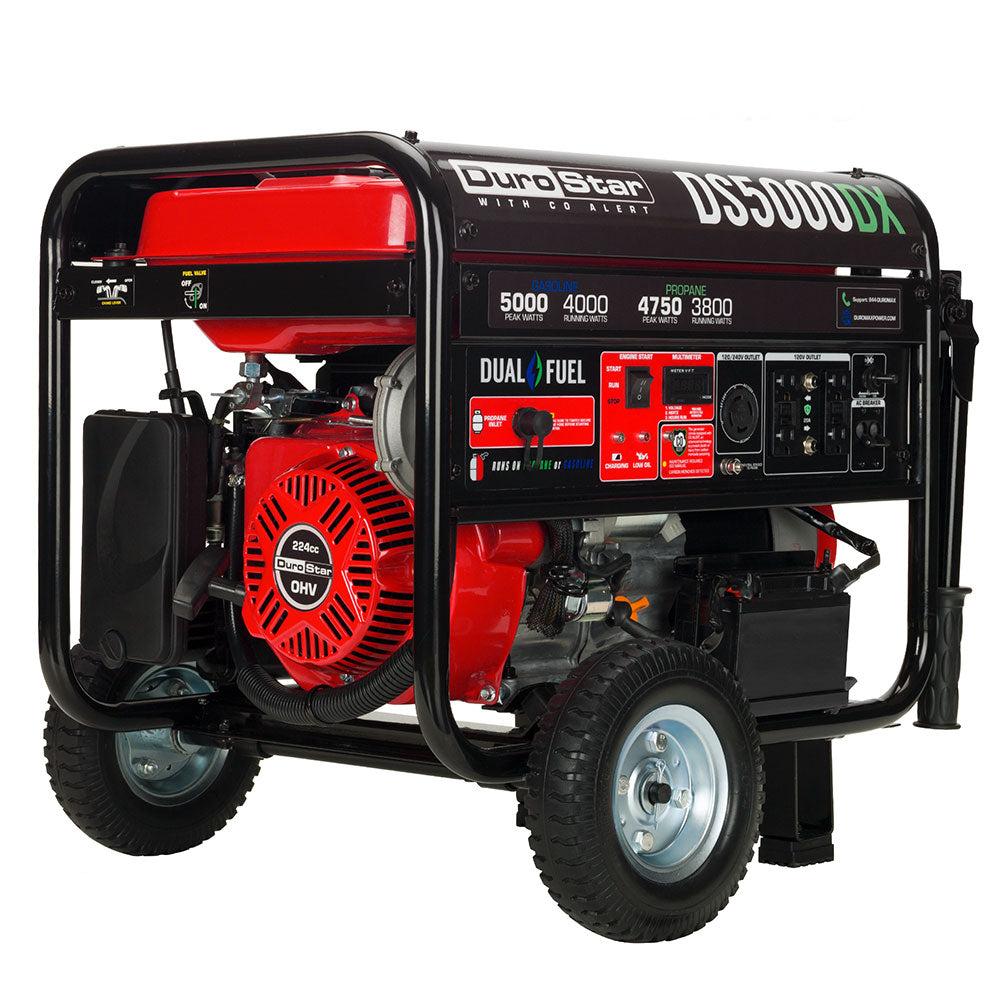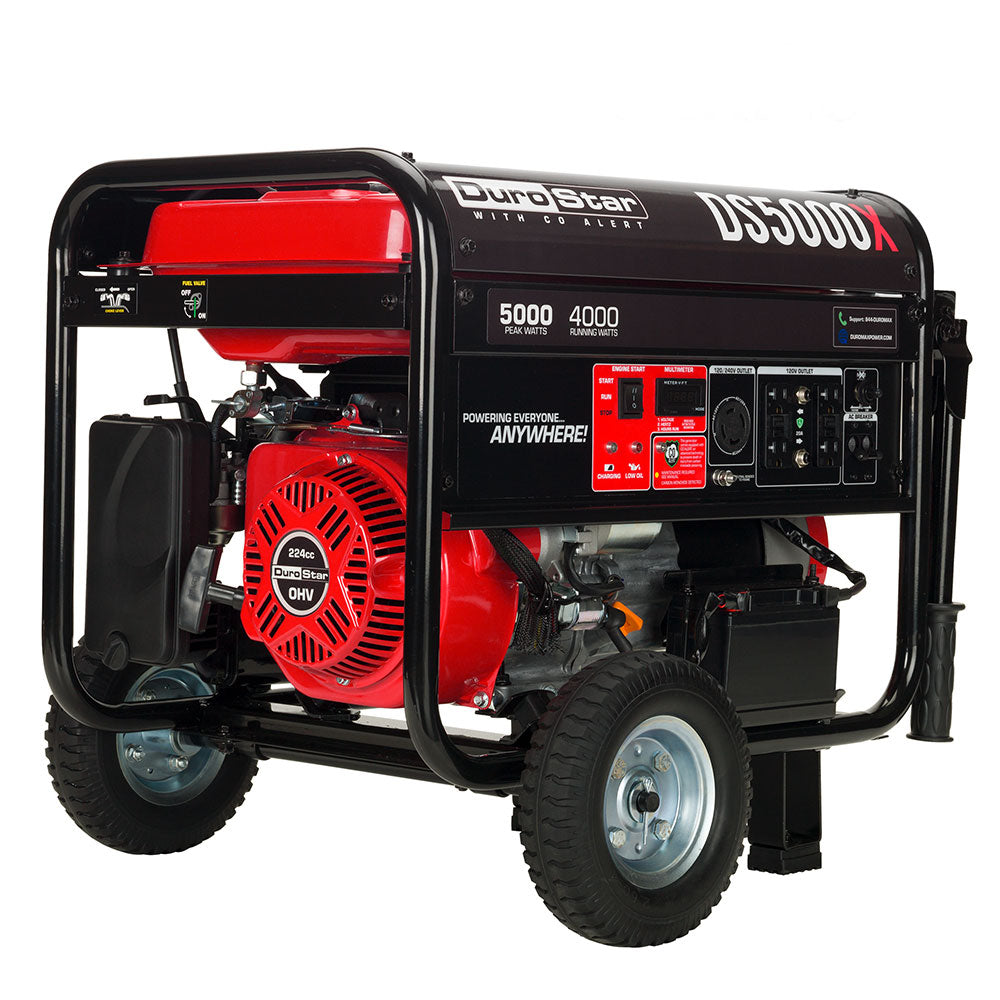Disclosure: This post contains affiliate links and I will be compensated if you make a purchase after clicking through my links. Learn More
A 5000-watt generator uses approximately 0.75 to 1 gallon of gas per hour. Consumption varies based on load and efficiency.
A 5000-watt generator is essential for powering homes and job sites during outages or off-grid situations. Understanding its fuel consumption helps in planning and budgeting for extended use. Efficient fuel management ensures the generator runs smoothly without unexpected interruptions. This knowledge is crucial for those relying on generators for critical tasks or backup power.
By estimating fuel needs accurately, users can maintain uninterrupted operations and avoid potential downtime. This makes it important to know how much gas a generator uses under varying conditions. Proper maintenance and usage can also optimize fuel efficiency and overall performance.

Introduction To 5000 Watt Generators
5000 watt generators are popular for their versatility and power. They can run essential appliances during power outages. These generators are useful for construction sites. They are also handy for outdoor events.
Popular Uses
5000 watt generators serve many purposes. Here are some popular uses:
- Home Backup: Keeps lights and refrigerators running.
- Construction: Powers tools like saws and drills.
- Recreation: Useful for camping and RV trips.
- Events: Supports sound systems and lighting.
Basic Specifications
Knowing the specifications of a 5000 watt generator helps in choosing the right one.
| Feature | Details |
|---|---|
| Power Output | 5000 watts |
| Fuel Type | Gasoline |
| Fuel Tank Capacity | 5-7 gallons |
| Run Time | 8-12 hours |
| Weight | 100-200 pounds |
Understanding Generator Fuel Consumption
When using a 5000 watt generator, understanding its fuel consumption is vital. Knowing how much gas your generator uses helps you plan better. It ensures you have enough fuel during outages or outdoor activities.
Factors Affecting Fuel Use
Several factors influence the fuel use of your generator. These include:
- Load: The more power you draw, the more fuel it uses.
- Generator Efficiency: Some generators are more efficient than others.
- Fuel Type: Different fuels burn at different rates.
- Environmental Conditions: Temperature and altitude can affect fuel consumption.
Common Fuel Types
Generators typically run on various fuel types. Here are the most common ones:
- Gasoline: Easily available, but burns quickly.
- Propane: Burns cleaner and is more efficient.
- Diesel: More efficient but less common for smaller generators.
| Fuel Type | Average Consumption per Hour (at 50% load) |
|---|---|
| Gasoline | 0.75 gallons |
| Propane | 0.9 gallons |
| Diesel | 0.4 gallons |
Understanding these factors helps in choosing the right generator and fuel type. This knowledge ensures efficient and cost-effective operation of your generator.
Calculating Gas Consumption
Understanding gas consumption is crucial for using a 5000 watt generator. This helps in planning the fuel needs efficiently. Let’s dive into the calculations.
Formula For Estimation
To estimate gas consumption, use this simple formula:
Gas Consumption (gallons/hour) = Power Output (watts) / Efficiency (watts/gallon)For a 5000 watt generator, efficiency is key. Most generators have an efficiency of around 10 watts per gallon.
Practical Examples
Let’s see how this works with some practical examples:
| Power Output (Watts) | Efficiency (Watts/Gallon) | Gas Consumption (Gallons/Hour) |
|---|---|---|
| 5000 | 10 | 5000 / 10 = 500 gallons/hour |
| 2500 | 10 | 2500 / 10 = 250 gallons/hour |
| 1000 | 10 | 1000 / 10 = 100 gallons/hour |
For clarity, here is a step-by-step approach:
- Identify the power output of your generator.
- Check the efficiency rating (usually 10 watts/gallon).
- Divide the power output by the efficiency.
Using these steps ensures accurate gas consumption estimates. This helps in planning and avoids running out of fuel.
Fuel Efficiency Tips
Maximizing fuel efficiency for your 5000 watt generator ensures longer run times and cost savings. Follow these simple tips to get the most out of your fuel.
Regular Maintenance
Regular maintenance keeps your generator running smoothly. Change the oil and air filter regularly. Clean the spark plug often. A well-maintained generator uses less gas.
- Change oil every 50 hours of use
- Replace the air filter every 100 hours
- Inspect and clean the spark plug every 30 hours
Optimal Load Management
Managing your generator’s load ensures better fuel efficiency. Avoid running the generator at full capacity. Operate it at 50-75% load for the best fuel consumption.
Use a load management table for reference:
| Load Percentage | Fuel Consumption (per hour) |
|---|---|
| 50% | 0.4 gallons |
| 75% | 0.6 gallons |
| 100% | 0.8 gallons |
Reducing unnecessary load helps your generator use less gas. Turn off appliances when not in use.
Comparing Generator Models
Choosing the right 5000 watt generator can be tricky. Different models use gas differently. Efficiency, user feedback, and technology matter. Let’s dive deeper into specific models.
High Efficiency Models
Some generators are designed to use less gas. These are called high efficiency models. They save money and fuel. Here are some top choices:
- Honda EU7000iS: Known for its fuel efficiency.
- Yamaha EF6300iSDE: Runs longer on less fuel.
- WEN 56380i: Affordable and efficient.
These models have advanced engines. They use smart technology to save fuel. This means you can run them longer without refueling often.
User Reviews
Users love sharing their experiences with generators. Here’s what they say about gas usage:
| Model | Average Gas Use (Gallons/Hour) | Average Rating |
|---|---|---|
| Honda EU7000iS | 0.5 | 4.8/5 |
| Yamaha EF6300iSDE | 0.45 | 4.7/5 |
| WEN 56380i | 0.6 | 4.5/5 |
High efficiency models often get better reviews. Users appreciate saving gas. They also mention the ease of use and reliability.
Reading user reviews helps. It gives real-world insights into gas usage. This can guide you to the best choice for your needs.

Environmental Considerations
Understanding how much gas a 5000-watt generator uses is crucial. But it’s equally important to consider its environmental impact. This includes emissions, regulations, and eco-friendly alternatives. Below, we explore these aspects.
Emissions And Regulations
Generators emit pollutants that affect air quality. A 5000-watt generator consumes around 0.75 gallons of gas per hour. This usage results in carbon monoxide and nitrogen oxides emissions. Governments regulate these emissions to protect the environment.
The Environmental Protection Agency (EPA) sets standards for generator emissions. Compliance with these standards is mandatory. Non-compliance can result in fines and penalties. Always check if your generator meets EPA regulations.
Eco-friendly Alternatives
Consider eco-friendly alternatives to reduce environmental impact. Solar-powered generators are a great choice. They produce no emissions and use renewable energy. Wind-powered generators are another option. They harness wind energy, a clean power source.
Hybrid generators combine gas and renewable energy. They are more efficient and reduce fuel consumption. These generators are an excellent compromise between traditional and green technologies.
| Type | Emissions | Fuel Source |
|---|---|---|
| Gas-Powered | High | Gasoline |
| Solar-Powered | None | Solar |
| Wind-Powered | None | Wind |
| Hybrid | Low | Gasoline + Renewable |
Switching to eco-friendly options benefits the environment. It also helps in adhering to regulations. Make an informed choice for a better future.
Cost Analysis
Understanding the cost implications of running a 5000-watt generator is crucial. It helps you budget and plan for fuel expenses. This section delves into the different aspects of cost analysis.
Short-term Vs Long-term Costs
Running a 5000-watt generator has both short-term and long-term costs. In the short term, you need to buy fuel and maybe oil. Long-term costs include maintenance and possible repairs.
Here’s a quick breakdown:
- Short-term Costs: Fuel, oil, and immediate repairs
- Long-term Costs: Regular maintenance, parts replacement, and major repairs
Short-term costs hit your wallet immediately. Long-term costs add up over time. Both are important for a full cost analysis.
Fuel Price Variations
Fuel prices are not constant. They vary by location and over time. This impacts how much you spend on running a 5000-watt generator. Below is a table showing possible fuel price variations:
| Location | Fuel Price per Gallon |
|---|---|
| Urban Areas | $3.50 |
| Rural Areas | $3.00 |
| Remote Areas | $4.00 |
Fuel prices can also change due to seasons or global events. Always keep an eye on fuel prices. Adjust your budget based on these variations.

Frequently Asked Questions
How Much Gas Does A 5000 Watt Generator Use Per Hour?
A 5000 watt generator typically uses about 0.75 gallons of gas per hour at half load.
How Long Will A 5000 Watt Generator Run On 5 Gallons Of Gas?
A 5000 watt generator can run approximately 6-7 hours on 5 gallons of gas, depending on the load.
What Factors Affect A Generator’s Gas Consumption?
Load, generator efficiency, and maintenance significantly affect how much gas a generator consumes.
Is A 5000 Watt Generator Fuel Efficient?
A 5000 watt generator is generally fuel efficient, especially when operated at optimal load and well-maintained.
Conclusion
Understanding the fuel consumption of a 5000 watt generator helps you plan better. It’s crucial for efficient usage. Monitoring fuel usage can save costs. Always refer to the manufacturer’s guidelines for accuracy. Proper maintenance ensures optimal performance. Choosing the right generator depends on your specific needs and fuel efficiency requirements.








